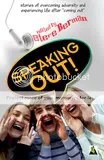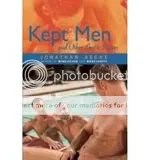Ben Monopoli is the author of The Cranberry Hush, a new novel that explores the difficulty of emotional attachments for
Vince, a young bisexual man, especially his relationship with his loving but
heterosexual college roommate, Griff.
Ben is a graduate of Emerson College, and his next novel, The Painting of Porcupine City, is due
out at the end of the summer. He lives
in Boston with his husband, Chris.
 Hi, Ben!
Hi, Ben!
Great to meet you. Could you give
us some background info? Where are you
from? What first triggered your interest
in writing fiction?
Gay
30-year-old male in Boston likes books, Italian food and long walks on the
beach. Just kidding. Actually that’s all true, especially beaches with
lighthouses. As for the writing, I’ve always had a thing for writing. Books are
important in my family, so that got me off to a good start, but mostly I just
like how writing feels. There’s a little jolt of awesome that happens when I
feel like I’ve written a good sentence. And fiction, in particular, because I
like making things up. To me, writing nonfiction feels too much like work.
What have the reactions to your book been like
from readers who identify as bisexual? I
guess I also should ask have there been generally different reactions from
people who identify as straight or gay, etc?
So
far the bisexuals have been silent, or at least haven’t identified themselves
to me. But I know they’re out there and I’d love for them to tell me if I got
my bi narrator right. As for other readers, most take Vince for the
well-adjusted bi guy that he is. But I’ve read a number of comments and reviews
where people either call him gay or label him a “so-called bisexual” or
otherwise put giant air-quotes around his bisexuality. I think there’s still a
widespread belief that bisexuals (especially bi men) don’t exist and are really
just gay guys halfway in the closet. You only need to listen to ten minutes of
Dan Savage’s podcast to know there are plenty of confident bi men out there,
and Vince is one of them.
Not many books that are self-published receive
so much praise and attention. Did you
bother trying to go the route of traditional publishing or did you decide to
self-publish from the outset? If so,
what led to that decision?
I
started the book in 2005, and two years later I proclaimed it finished and
began sending query letters to agents and publishers. I got some bites but no
deals, which in hindsight is no surprise because the book was a mess. Tinkering
because the book was a mess. Tinkering
with it for another few years resulted in a story I’m much happier with. And of
course during that time the Kindle and Nook came into existence. That gave me
an alternative to the traditional process, which can be extremely
time-consuming and frustrating and paper-intensive — I didn’t have the
patience to try it again. Immediate gratification has its perks. I don’t think
self-publishing or traditional has to be an either-or choice, though.
Self-publishing might be a springboard to something more traditional. In the
meantime, I was making money and getting great feedback within a week of
clicking “publish,” whereas with the traditional route it takes weeks or months
just to hear back about a query.
Similar to Generation
X by Douglas Coupland, it seems like part of your story is about today’s young
college graduates being in a direction-less limbo. How do you feel about that assessment?
I
wasn’t trying to make any commentary on college students in general. The book
is really about my own post-college void, but if people are relating to it (and
they seem to be) maybe that’s proof such a thing exists. When I started the
book I was only two years out of Emerson, and at that point I would’ve given
anything to go back. It didn’t help that after graduating I moved into an
apartment within sight of my old dorm. I had to walk past it every day and see
people who weren’t me going in and out. Writing a book was the closest I could
get to going back. In the end it pretty much resolved the issue for me. I’ve
flown through the post-college void and have been safely on the other side for
a long time.
It seems likely that your invention, Shuster
College, is based on your experiences at Emerson, and Vince Dandro is such a
fully realized character. How much, if
any, of Vince is based on your experiences?
Shuster
College is straight-up Emerson, only with different courses and school colors.
As for the rest of the book, there are several scenes that are verbatim from my
life, but that’s all I’ll say!
The title, The
Cranberry Hush, comes from your character, Griff, and his synesthesia. He perceives emotions as having colors. Is synesthesia part of your life or of
someone you know? If someone asked you,
“exactly what kind of mood is cranberry,” how would you respond?
Cranberry
is the color of the mood of musty comic books, black-and-white movies, and
Billie Holiday. It’s the opposite of pop, which would probably be neon yellow
or something. That’s according to Griff. I made up the form of synesthesia
Griff has, based on an extreme version of how everyone’s mood is affected by
color (if there was ever a waiting room painted fire-engine red people would be
murdering each other rather than quietly perusing US Weekly). As for me, I do
have a mild form of it where words and letters make me think of specific colors
(E, for example, is a blue letter) but I don’t talk about it much. I imagine
people suspect it’s just an affectation I’ve put on to sound interesting,
something I chose instead of dressing goth. But really it’s no more interesting
than smelling chocolate-chip cookies and thinking of grandma. The difference is
that cookies/grandma is a learned, explainable connection and E/blue is just a
brain hiccup. But color is important to me, and I tried to infuse The Cranberry
Hush with color. It’s also a big theme in my next novel, The Painting of
Porcupine City, which is about graffiti artists.
What was the most difficult aspect of writing The Cranberry Hush? Was there some aspect that you found to be
the most enjoyable? What kind of process
do you use when working on a novel or is that something that is still
developing?
The
most difficult things were technical things I’d never even thought about before
plunging into the book. Like the importance of using varying sentence
structures so not every sentence begins with “he” or “I.” Also pacing was a
nightmare – the book once had a gigantic epilogue that I eventually collapsed
into a brief daydream that appears near the end of the book. The only thing
that comes easy for me is dialog, so when I’m writing a scene I write the
conversation first and then fill the action in around it. I don’t plan much and
usually when I start a scene I don’t know where it’s going to end up. Given
that, you can imagine it was pretty exciting for me every time Griff and Vince
got into bed together. I was always thinking, “This might be the time!”
Could you discuss some of the books that are
most important to you? Who are some of
your favorite authors?
John
Steinbeck and John Updike are my two big favorites. They make me want to quit
writing because I’ll never be as good as them, but they also make me want to
write every day just to try to come closer. Michael Chabon is another favorite
– Wonder Boys and The Mysteries of Pittsburgh are big influences.
Junot Diaz (who wrote The Brief Wondrous Life of Oscar Wao) is practically god incarnate, as far as I’m concerned. As
for other self-published authors, I’ve been talking regularly with Jay Bell, who wrote Something Like Summer (which you should definitely read… after The Cranberry
Hush, haha). It’s fun to compare notes and watch our books tussle in the
bestseller rankings.
You are one of the first men I know who is
legally married to a man. What
unexpected difficulties, if any, have you had from incorrect assumptions,
confused heterosexuals, and so forth?
Has it been getting easier?
I’m
lucky that the difficulties have been mostly paperwork-related. For example,
filing taxes is a confusing pain because according to Massachusetts I’m
married, but according to the federal government my husband and I don’t even
know each other. But family, friends, coworkers have been supportive across the
board, and we’re very thankful for that. Strangers do of course make
assumptions that the ring on my finger has a twin on the finger of a woman, but
that’s a perfectly acceptable assumption to make as far as I’m concerned. No
one has ever reacted badly when I correct them. Same-sex marriage has been
legal in Massachusetts for more than seven years, and I think to most people
here it’s old news.
Compared to a lot of authors who write so well,
you’re quite young. Looking toward the
future, if you could picture your dream life, how would you imagine it?
My
automatic response is to say I want to be able to write full-time someday, but
I don’t know if that’s true. I wouldn’t want writing to feel like a job rather
than the escape I like it to be — something I squeeze into evenings and
lunch-hours. I like to imagine the book becoming a movie, but man, that could
be a disaster too. I guess my only genuine goal is to do my best to write like
the writers I mentioned earlier. I’ll never get there, of course, but the
effort’s a worthwhile goal. I think The Cranberry Hush is a good start and The
Painting of Porcupine City is a step in the right direction. I hope people like
them both!
Thanks so much, Ben!
Thank
you, sir! It’s been fun.
 Buy it now direct from Bywater Books
Buy it now direct from Bywater Books
 Scheduled to release September 12th. Order it today from
Scheduled to release September 12th. Order it today from  Buy it now direct from
Buy it now direct from  Buy it now from our Amazon.com store –
Buy it now from our Amazon.com store – 
 Buy it now from
Buy it now from  Buy from Lethe Press
Buy from Lethe Press Buy it now from our Amazon.com store –
Buy it now from our Amazon.com store –  Hi, Ben!
Hi, Ben!  because the book was a mess. Tinkering
because the book was a mess. Tinkering